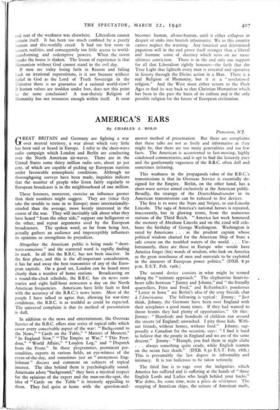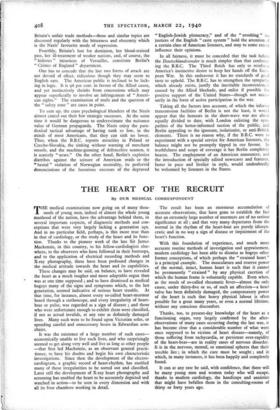AMERICA'S EARS
By CHARLES J. ROLO
GREAT BRITAIN and Germany are fighting a war over neutral territory, a war about which very little has been said or heard in Europe. I refer to the short-wave radio campaign which London and Berlin are conducting over the North American air-waves. There are in the United States some thirty million radio sets, about 3o per cent. of which are capable of picking up European stations under favourable atmospheric conditions. Although no thoroughgoing surveys have been made, inquiries indicate that the number of people who listen fairly regularly to European broadcasts is in the neighbourhood of one million.
These listeners, moreover, exercise an influence greater than their numbers might suggest. They are (since they take the trouble to tune in to Europe) more internationally- minded than the average, more keenly interested in the course of the war. They will inevitably talk about what they have heard " from the other side," support one belligerent or the other, and repeat arguments used by the European broadcasters. The spoken word, so far from being lost, actually gathers an audience and imperceptibly influences its opinions or strengthens its prejudices.
Altogether the American public is being made " short- wave-conscious " and the scattered word is rapidly finding its mark. In all this the B.B.C. has not been inactive. In the first place, and this is the all-important consideration, it has far and away the best transmitter of any of the Euro- pean capitals. On a good set, London can be heard more clearly than a number of home stations_ Broadcasting on a round-the-clock schedule, the B.B.C. has six news sum- maries and eight half-hour newscasts a day on the North American frequencies. Americans have little fault to find with the accuracy of the B.B.C.'s news items. Most of the people I have talked to agree that, allowing for war-time conditions, the B.B.C. is as truthful as could be expected. The universal complaint is that its method of presentation is dull.
In addition to the news and entertainment, the Overseas Service of the B.B.C. offers nine series of topical talks which cover every conceivable aspect of the war: " Background to the News," " Cards on the Table," " Matters of Moment," " In England Now," " The Empire at War," " This Free- dom," " World Affairs," " London Log," and " Dispatch from the Front." In these programmes, prominent per- sonalities, experts in various fields, an eye-witness of the event-of-the-day, and sometimes just an " anonymous Eng- lishman" discuss and comment on subjects of topical interest. The idea behind them is psychologically sound. Americans adore "background," they have a mystical respect for the opinions of the expert and the man-on-the-spot, the idea of " Cards on the Table " is intensely appealing to them. They feel quite at home with the question-and- Princeton, N.7.
answer method of presentation. But there are complaints that these talks are not as lively and informative as they might be, that there are too many generalities and too few facts. The American is accustomed to fast-moving, highly condensed commentaries, and is apt to find the leisurely pace and the gentlemanly vagueness of the B.B.C. often dull and sometimes irritating.
This weakness in the propaganda value of the B.B.C.'s transmissions is that its Overseas Service is essentially de- signed for the Empire. Berlin, on the other hand, has a short-wave service aimed exclusively at the American public. Broadly, the strategy of the Deulschlandssender in its American transmissions can be reduced to five devices.
The first is to wave the Stars and Stripes, to out-Lincoln Lincoln. The saga of America's national heroes is repeated, inaccurately, but in glowing terms, from the numerous stations of the Third Reich. " America last week honoured the memory of Abraham Lincoln and on the 22nd will cele- brate the birthday of George Washington. Washington is rated by Americans . . . as the prudent captain whose political wisdom charted for the American Ship of State a safe course on the troubled waters of the world. . . . Un- fortunately, there are those in Europe who would have America forget (his) words of wisdom, who look on America as the great storehouse of men and materials to be exploited in the interests of European power politics." (DXB. 8.3o p.m. E.S.T. Feb. 19th.) The second device consists in what might be termed taking the " intimate approach." The elephantine heart-to- heart talks between " Jimmy and Johnny," and " the friendly quarrellers, Fritz and Fred," and Keltenbach's ponderous " Letter to Iowa " are Berlin's idea of the cosy fireside chat a l'Arnericaine. The following is typical : Jimmy : " Just think, Johnny, the Germans have been over England with their aeroplanes a good many times. If they had wanted to throw bombs they had plenty of opportunities." Or this: Jimmy : " Hundreds and hundreds of children run around the streets (of England) unwashed. I pity those kids. With- out friends, without homes, without food." Johnny, sup- posedly a Canadian for the occasion, says: "I find it hard to believe that the people in England and we are of the same descent." Jimmy: " Humph, you find them in night clubs . . . always something quite crude, while English seamen on the ocean face death." (DXB. 8.3o E.S.T. Feb. 28th.) This is presumably the last degree in informality and intimacy. It is too ludicrous to be taken seriously.
The third line is to rage over the indignities which America has suffered and is suffering at the hands of " those English Lords and Ladies who laugh behind your backs." War debts, for some time, were a piece de resistance. The stopping of American ships, the seizure of American mails, Britain's unfair trade methods—these and similar topics are discussed regularly with the bitterness and obscenity which is the Nazis' favourite mode of expression.
Fourthly, Britain's lust for dominion, her blood-stained past, her ill-treatment of weaker nations, and, of course, the " hideous " injustices of Versailles, constitute Berlin's " Crimes of England " department.
One has to concede that the last two forms of attack are not devoid of effect, ridiculous though they may seem to English ears. The American public is inclined to be lack- ing in logic. It is 96 per cent. in favour of the Allied cause, and yet instinctively shrinks from concessions which may appear superficially to involve an infringement of " Ameri- can rights." The examination of mails and the question of the " safety zone " are cases in point.
To sum up, the crass psychological blunders of the Nazis almost cancel out their few strategic successes. At the same time it would be dangerous to underestimate the nuisance value of German propaganda. The Nazis enjoy the para- doxical tactical advantage of having sunk so low, in the minds of most Americans, that they can sink no lower. Thus, when the B.B.C. reports atrocities in Poland or Czecho-Slovakia, the sinking without warning of merchant vessels, and the machine-gunning of defenceless seamen, it is scarcely " news." On the other hand, Berlin's explosive diatribes against the seizure of American mails or the " brutal " violation of Norwegian neutrality, its perfervid denunciations of the luxurious excesses of the depraved " English-Jewish plutocracy," and of the " revolting " in- justices of the English " caste system " hold the attention f a certain class of American listeners, and may to some ext,.-t influence their opinions.
In all fairness, it must be conceded that the task before the Deutschlandssender is much simpler than that confront- ing the B.B.C. The Third Reich has only to reinfor.,! America's instinctive desire to keep her hands off the Ern _ pean War. In this endeavour it has no standards of g(, taste to uphold. The B.B.C. has to strengthen the sympal which already exists, justify the inevitable inconvenient caused. by the Allied blockade, and enlist if possible positive support of the United States—though not nece,- sarily in the form of active participation in the war.
Taking all the factors into account, of which the inferior transmission facilities of Berlin is not the least, it would appear that the honours in the short-wave war are about equally divided to date, with London enlisting the sym- pathies of the better-informed section of the public, and Berlin appealing to the ignorant, isolationist, or anti-British elements. There is no reason why, if the B.B.C. were to experiment with a special service for American listeners, the balance might not be promptly tipped in our favour. In truthfulness and scope of coverage it has Berlin completely beaten. The employment of an American announcer, and the introduction of specially edited newscasts and features, faster in pace and livelier in style, would undoubtedly be welcomed by listeners in the States.







































 Previous page
Previous page